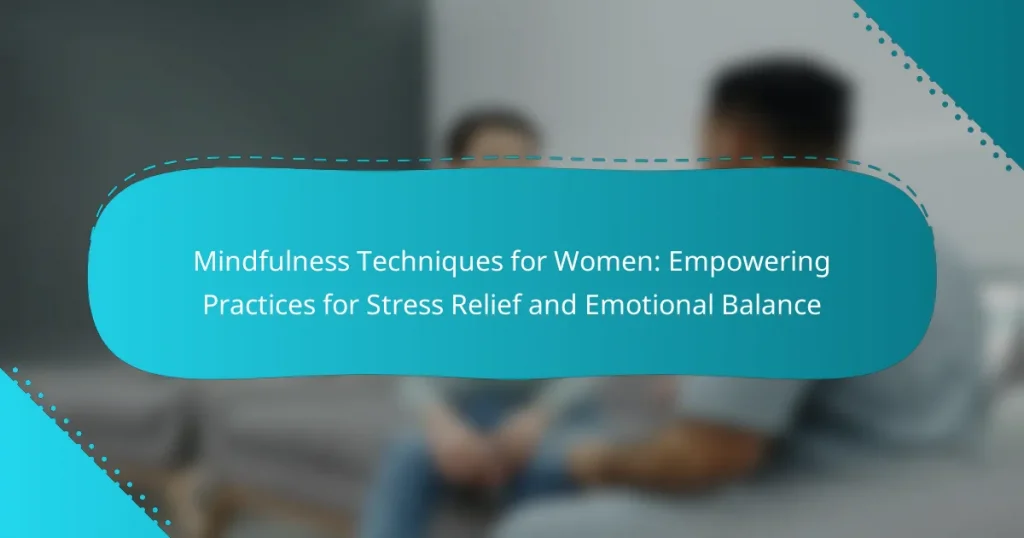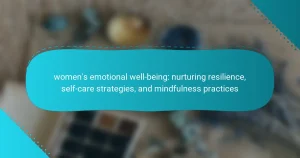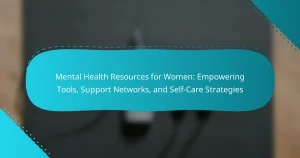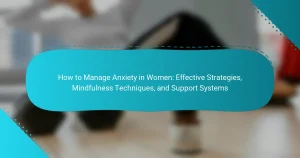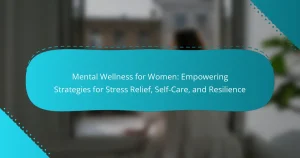Mindfulness techniques for women provide essential tools for stress relief and emotional balance. Key practices include meditation, deep breathing, body scanning, and mindful movement. Unique approaches like guided imagery and forest bathing further enhance emotional resilience. Engaging in these techniques fosters a supportive community and nurtures self-awareness, empowering women to improve their overall well-being.
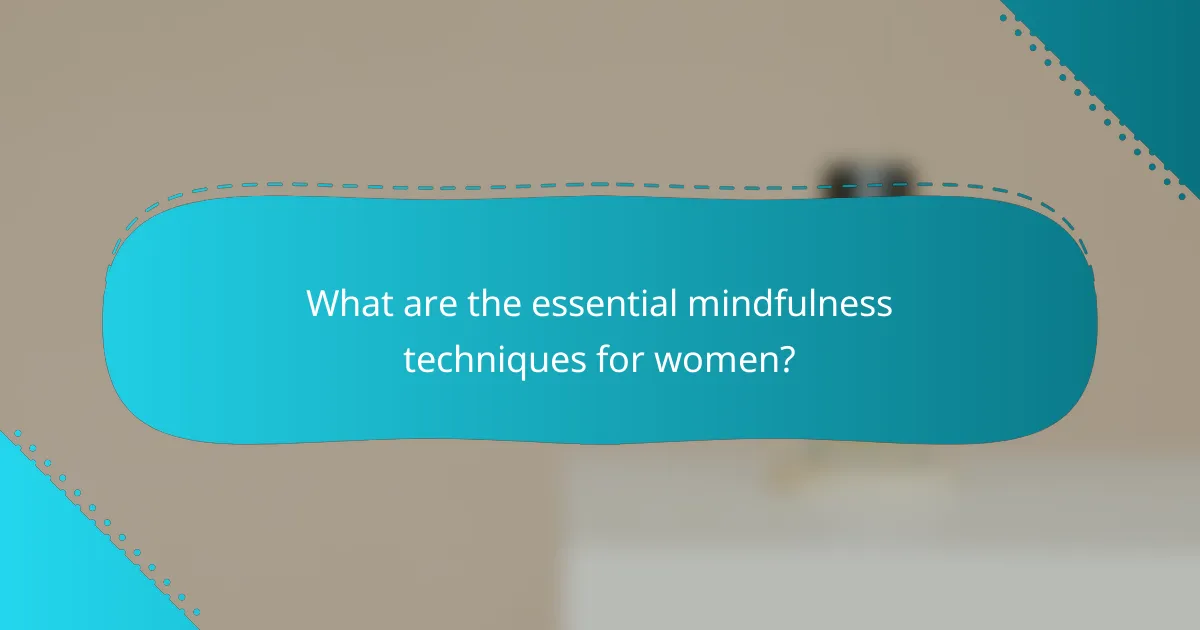
What are the essential mindfulness techniques for women?
Mindfulness techniques for women focus on enhancing emotional balance and reducing stress. Key practices include meditation, deep breathing, body scanning, and mindful movement.
Meditation involves setting aside time to focus on thoughts and feelings without judgment. Deep breathing techniques help centre the mind, promoting relaxation. Body scanning encourages awareness of physical sensations, fostering a connection between mind and body. Mindful movement, such as yoga, integrates physical activity with mindfulness, enhancing overall well-being.
These techniques empower women to manage stress effectively, improve emotional resilience, and cultivate a deeper sense of self-awareness.
How does mindfulness impact women’s mental health?
Mindfulness significantly enhances women’s mental health by reducing stress and promoting emotional balance. Techniques such as meditation, breathing exercises, and mindful movement foster self-awareness and emotional regulation. Research indicates that women practicing mindfulness experience lower anxiety and depression levels, contributing to overall well-being. Regular engagement in these practices cultivates resilience, empowering women to navigate life’s challenges effectively.
What are the benefits of mindfulness practices for stress relief?
Mindfulness practices significantly reduce stress by enhancing emotional regulation and promoting relaxation. These techniques, such as meditation and deep breathing, empower women to manage anxiety effectively. Research indicates that regular mindfulness practice can lower cortisol levels, improving overall mental health. Additionally, mindfulness fosters self-awareness, enabling better responses to stressors.
How can mindfulness enhance emotional balance?
Mindfulness enhances emotional balance by fostering self-awareness and reducing stress. Techniques such as meditation, deep breathing, and mindful movement help women manage emotions effectively. Research shows that regular mindfulness practice can decrease anxiety levels by up to 30%. Additionally, mindfulness encourages a non-judgmental attitude towards thoughts and feelings, promoting emotional resilience. This unique attribute of mindfulness empowers women to respond to stressors with clarity and calmness.
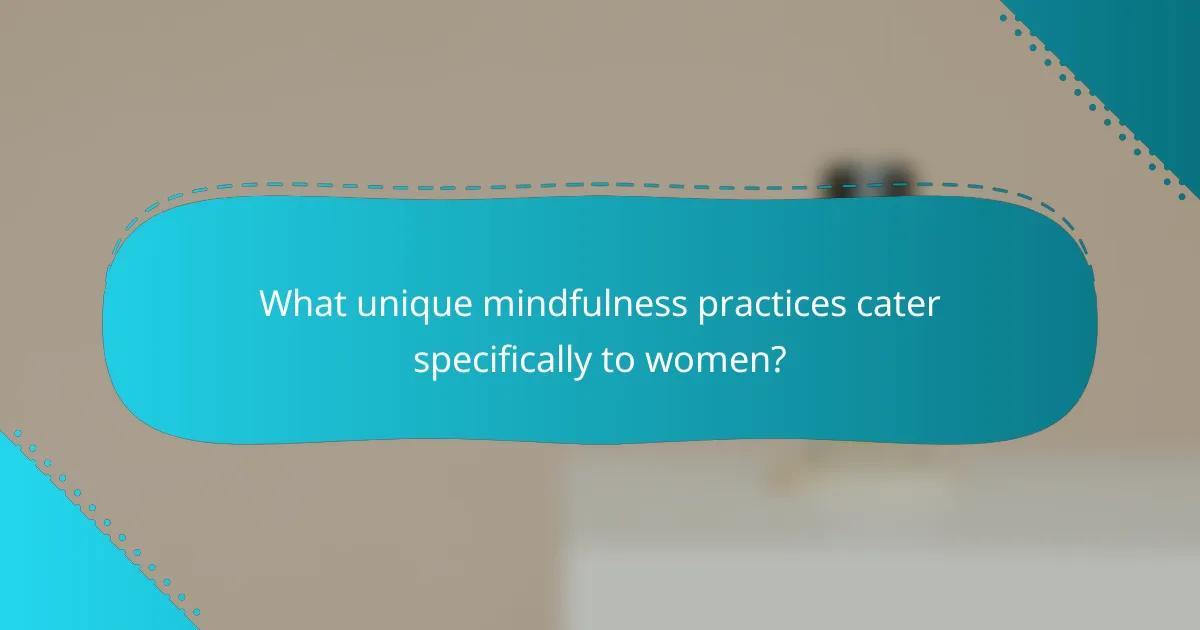
What unique mindfulness practices cater specifically to women?
Mindfulness practices uniquely designed for women include techniques that enhance emotional resilience and promote self-care. These practices focus on nurturing the mind and body connection, fostering a supportive environment for mental well-being.
One effective technique is the use of guided imagery, which helps women visualise positive outcomes and reduce anxiety. This practice can be particularly beneficial during stressful times, providing a safe mental space to retreat.
Another unique practice is the integration of movement-based mindfulness, such as yoga or dance. These activities not only promote physical health but also empower women to express their emotions through movement, enhancing emotional balance.
Additionally, women-specific support groups or circles can create a sense of community, allowing for shared experiences and collective mindfulness practices. This communal approach fosters connection and strengthens emotional support networks among women.
How can yoga be integrated into mindfulness for women?
Integrating yoga into mindfulness enhances emotional balance and stress relief for women. Yoga promotes awareness of the body and breath, fostering a deeper connection to the present moment. Practicing mindful yoga encourages self-acceptance and reduces anxiety. Techniques such as breath control and meditation during yoga sessions cultivate a tranquil mindset. Additionally, incorporating affirmations in yoga practice can empower women, reinforcing positive self-image and resilience.
What are specific yoga poses that promote mindfulness?
Specific yoga poses that promote mindfulness include Child’s Pose, Mountain Pose, Tree Pose, and Corpse Pose. These poses enhance focus, encourage deep breathing, and foster a sense of presence. Child’s Pose provides a calming effect, while Mountain Pose strengthens grounding. Tree Pose improves balance, and Corpse Pose facilitates relaxation. Each pose supports emotional balance and stress relief, making them effective mindfulness techniques for women.
What role does journaling play in mindfulness for women?
Journaling plays a crucial role in mindfulness for women by enhancing self-reflection and emotional regulation. This practice encourages women to articulate their thoughts and feelings, leading to greater self-awareness. Regular journaling can reduce stress levels and promote emotional balance by providing a safe space for expression. Studies show that women who journal frequently report improved mental health and resilience. Journaling serves as a unique mindfulness technique, fostering a deeper connection to one’s inner self and enhancing overall well-being.
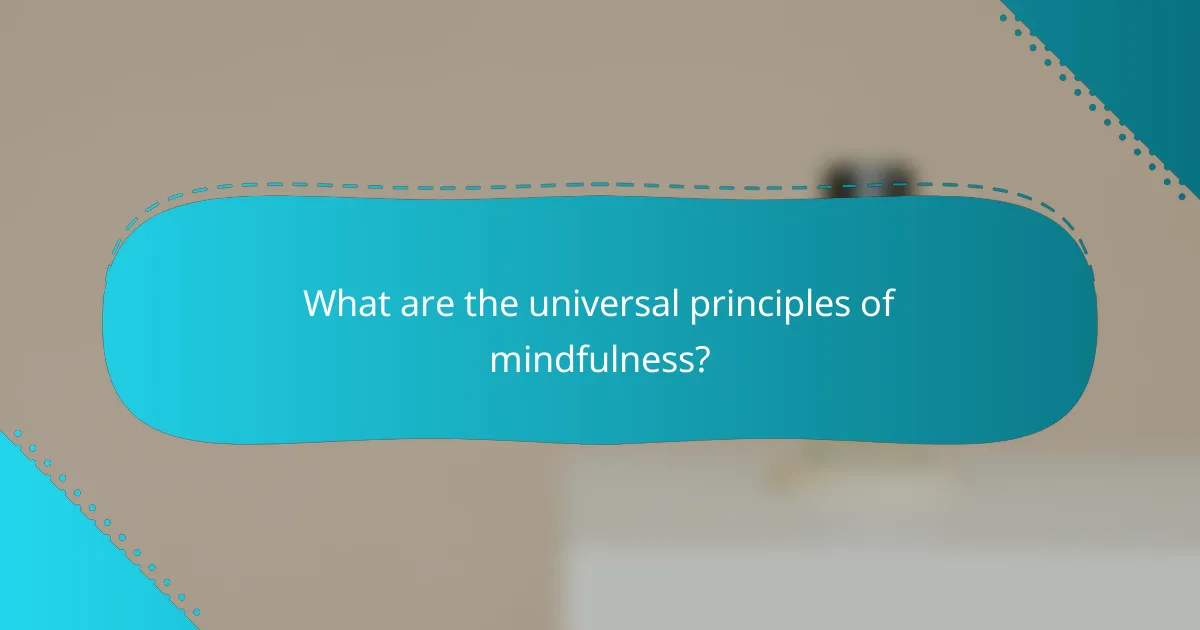
What are the universal principles of mindfulness?
Mindfulness techniques for women focus on enhancing emotional balance and reducing stress. Key principles include present-moment awareness, non-judgmental observation, and acceptance of thoughts and feelings. These practices empower women to cultivate resilience and improve overall well-being. Regular engagement in mindfulness can lead to reduced anxiety and increased emotional regulation, fostering a healthier mindset.
How can breathwork serve as a mindfulness tool?
Breathwork serves as a powerful mindfulness tool by promoting emotional balance and reducing stress. This practice enhances self-awareness and encourages a deeper connection to the present moment. Research indicates that breathwork can decrease anxiety levels and improve overall mental clarity. Regular engagement with breathwork techniques fosters resilience, helping women manage daily stressors effectively. Additionally, breathwork can be tailored to individual needs, making it a unique attribute of mindfulness practices.
What are effective breathing techniques for stress relief?
Deep breathing, box breathing, and diaphragmatic breathing are effective techniques for stress relief. These techniques promote relaxation and enhance emotional balance.
Deep breathing involves inhaling deeply through the nose, holding for a few seconds, and exhaling slowly through the mouth. This practice reduces anxiety and calms the nervous system.
Box breathing consists of four equal parts: inhale for four counts, hold for four counts, exhale for four counts, and hold again for four counts. This structured approach fosters focus and clarity.
Diaphragmatic breathing encourages full oxygen exchange, which can lower heart rate and blood pressure. It involves breathing deeply into the abdomen rather than shallowly into the chest.
Incorporating these techniques into daily routines can significantly enhance mindfulness and emotional well-being.
What mindfulness exercises can be practiced daily?
Daily mindfulness exercises include deep breathing, body scanning, mindful walking, and gratitude journaling. These practices enhance emotional balance and reduce stress. Deep breathing focuses on inhaling and exhaling slowly, promoting relaxation. Body scanning involves mentally checking in with each part of the body, fostering awareness. Mindful walking encourages being present in each step, connecting with surroundings. Gratitude journaling involves writing down things one appreciates, shifting focus to positivity. Each exercise can be tailored to individual preferences and schedules for maximum effectiveness.
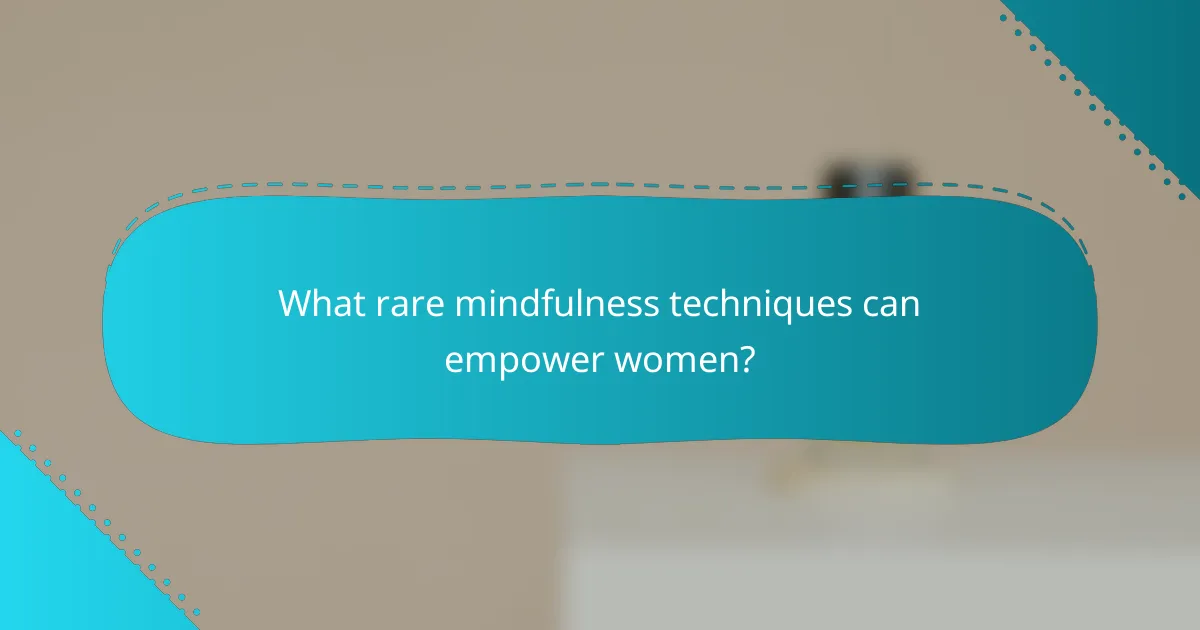
What rare mindfulness techniques can empower women?
Mindfulness techniques that empower women include rare practices like forest bathing, sound healing, and expressive arts therapy. These methods promote deep emotional balance and stress relief.
Forest bathing, or Shinrin-yoku, immerses individuals in nature, enhancing mental clarity and reducing anxiety. Sound healing uses vibrational frequencies to restore emotional equilibrium, while expressive arts therapy encourages self-discovery through creative expression. Each technique uniquely supports women’s empowerment by fostering resilience and self-awareness.
How can nature immersion enhance mindfulness practice?
Nature immersion enhances mindfulness practice by fostering a deeper connection to the present moment. Engaging with natural environments reduces stress and promotes emotional balance. Studies indicate that spending time in nature can lower cortisol levels, leading to improved mental well-being. Practicing mindfulness in these settings can amplify focus and awareness, enhancing overall mindfulness techniques. Women, in particular, may find nature immersion beneficial for cultivating resilience and emotional stability, making it a unique attribute of their mindfulness journey.
What is the significance of community support in mindfulness?
Community support is crucial for enhancing mindfulness practices among women, fostering emotional balance and stress relief. Engaging with supportive networks encourages accountability and motivation, which are essential for sustaining mindfulness techniques. Research indicates that women who participate in group mindfulness activities report higher levels of emotional resilience. Additionally, shared experiences within a community create a sense of belonging, reducing feelings of isolation, which can be particularly beneficial during challenging times. Ultimately, community support amplifies the effectiveness of mindfulness practices, making it a unique attribute that empowers women in their journey towards emotional well-being.
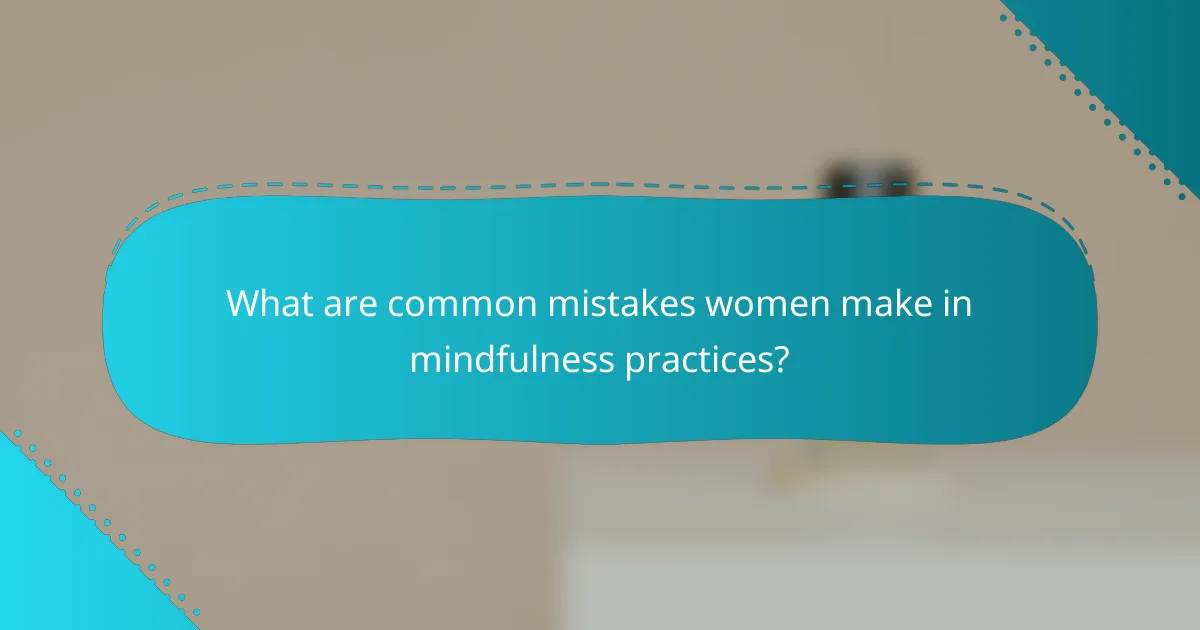
What are common mistakes women make in mindfulness practices?
Women often make mistakes in mindfulness practices by neglecting consistency, setting unrealistic expectations, and failing to create a supportive environment. Common pitfalls include skipping sessions, which disrupts progress, and comparing their journey to others, leading to frustration. Additionally, many women overlook the importance of self-compassion, which is vital for emotional balance. Practicing mindfulness should be a personal journey, tailored to individual needs and experiences.
How can women optimize their mindfulness routines?
Women can optimize their mindfulness routines by incorporating specific techniques that enhance stress relief and emotional balance. Start with daily meditation, focusing on breath awareness to cultivate presence. Integrate yoga to improve physical and mental flexibility, promoting relaxation. Journaling can help process emotions and track progress, while nature walks foster connection with the environment. Engaging in mindful eating encourages awareness of food choices and promotes healthier habits. Finally, setting aside time for self-care routines reinforces the importance of personal well-being.
What expert insights can enhance mindfulness for women?
Mindfulness techniques can significantly enhance emotional balance and stress relief for women. Practicing self-compassion is essential, as it fosters a positive mindset and reduces negative self-talk. Incorporating breathing exercises can help regulate emotions and promote relaxation. Engaging in mindful movement, such as yoga, encourages physical awareness and emotional release. Furthermore, journaling can serve as a powerful tool for reflection, allowing women to process their thoughts and feelings effectively.
What actionable steps can women take to start mindfulness today?
To start mindfulness today, women can practice deep breathing, engage in daily meditation, and incorporate mindful walking into their routines. These techniques enhance emotional balance and reduce stress.
1. Deep Breathing: Spend five minutes focusing on your breath. Inhale deeply through your nose and exhale slowly through your mouth.
2. Daily Meditation: Set aside ten minutes each day to meditate. Use guided apps or simply focus on your breath.
3. Mindful Walking: Take a walk outdoors, paying attention to the sensations of your feet touching the ground and the sounds around you.
These actionable steps empower women to cultivate mindfulness effectively.
